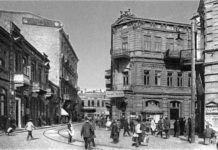A territorial and ethnic conflict between Armenians and Azerbaijanis in a mountainous region of the Soviet Caucasus had led–according to reports filtering across the Soviet border–to tension, clashes, protest demonstrations at public events and pleas by Armenians to Moscow for help, including a recent letter to Leonid I. Brezhnev. The disputed area is the Nagorno-Karabakh Autonomous Oblast, a pocket of only 1,699 square miles and 153,000 people engaged primarily in livestock raising, food-processing, light industry and such old crafts as rug making and silk spinning.
Although 80 percent of the area’s inhabitants are Armenians, it was assigned in 1923 to Azerbaijan, whose people are of Turkic-Islamic background.
The Armenians in Karabakh charge that they are victims of cultural oppression, economic discrimination and other ethnic disadvantages. They demand, with increasing insistence, that Karabakh be put under the Armenian Republic.
Moscow’s decision to turn over the Karabakh region to Azerbaijan was in conflict with earlier promises to the Armenians. The promises were reflected in a declaration on Dec. 1, 1920, in the Communist Party newspaper Pravda by Stalin, then Lenin’s Commissar for Nationalities.
Stalin, in a commentary on the Communist victory in Armenia, said Azerbaijan had relinquished claims to Karabakh and other territories historically Armenian. He went on to proclaim: “The age-old enmity between Armenia and the surrounding Moslem peoples has been dispelled at one stroke by the establishment of fraternal solidarity between the working people of Armenia, Turkey and Azerbaijan.”
The Nagorno-Karabakh Armenians have been trying to have their region transferred to the Republic of Armenia, which is adjacent but across a mountain range.
The recent letter to the Soviet leader was sent by Sero Khanzadian, Communist Party member since 1943 and at one time a member of the Central Committee of the Party in the Armenian Republic. Mr. Khanzadyan complained of various disorders, which included “casualties,” and urged Mr. Brezhnev to intervene on behalf of the Armenians, according to a copy of his letter taken out of the Soviet Union by travels.
Mr. Khanzadyan’s letter was made available to The New York Times, in English translation, by Dr. Vahakn N. Dadrian, an authority on Armenia and a professor of sociology at the State Universe of New York at Geneseo.
Dr. Dadrian visited Armenia recently and met Mr. Khanzadian in Yerevan, the capital city.
In the letter to Mr. Brezhnev, Mr. Khanzadyan charged that a “national injustice” existed in Karabakh and accused the local authorities of insulting Armenians and calling them “backward” and “ignorant” for their nationalist sentiments.
Mr. Khanzadyan, an author of historical novels, denied that the Armenians in Karabakh had “voluntarily” accepted their status as part of the Republic of Azerbaijan.
“The purely Armenian region of Karabakh, which is part of the frontiers of our mighty country – -with its 80 percent Armenian schools, with its claim for Armenian as the national language – – must be incorporated into Soviet Socialist Armenia.”
The complaint to Mr. Brezhnev by Mr. Khanzadyan seemed a bolt step with uncertain consequences. In 1975, Armenians in Karabakh were sharply rebuked, and some were ousted from the party or imprisoned on charges of nationalist agitation contrary to “the principle of Leninist friendship of peoples and proletarian internationalism.”
[Raymond H. Anderson in The New York Times, December, 1977]
The Karabagh File, Documents and Facts, 1918-1988, First Edition, Cambridge Toronto 1988, by the ZORYAN INSTITUTE, edited by: Gerard J. LIBARIDIAN, pp. 51-52.
Image – Shushi












